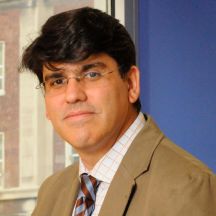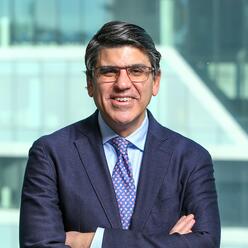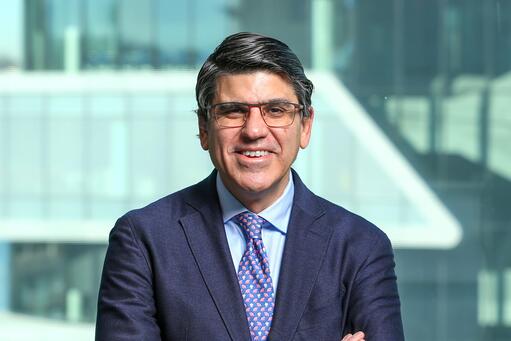An ambitious new era has begun at Columbia Business School. To ensure students stay ahead of the complexities of the ever-evolving business world, CBS recently unveiled its brand new, state-of-the-art buildings and added courses on pressing topics such as climate change and digital innovation.
Also getting a refresh: the school's prestigious Value Investing Program.
The program has a long and distinguished history of preparing its students to rank among the best investment managers in the world. In fact, the concept of value investing first hit the map in 1928 when pioneers Benjamin Graham and David Dodd '21 began teaching CBS students — and Wall Street professionals — their unique philosophy for finding assets trading at a discount to what they believed was intrinsic value. The professors co-authored the classic text, Security Analysis (1934). Graham, known as “the Dean of Wall Street,” was on faculty at the School until 1957.
Just over two decades ago, the curriculum cemented its history at CBS when it gained its permanent home in the Heilbrunn Center for Graham & Dodd Investing. Robert Heilbrunn studied the method under Graham and championed the discipline throughout his career.
But, despite its impressive pedigree, the program continues to evolve.
“As financial markets change, so has the curriculum of the Value Investing Program,” says Tano Santos, the Robert Heilbrunn Professor of Asset Management and Finance and faculty director of the Heilbrunn Center. “We are moving beyond the traditional tenets of value investing — to make our students more than value investors but total investors.”
What's New
Historically, value investors were disciplined stock pickers, but increasingly, the tools and techniques of value investing apply much more broadly, says Santos. “Clearly, there are areas such as infrastructure investing or ESG where it will be very beneficial to apply traditional value investing ideas,” he notes.
To prepare for this new era of investing, the Heilbrunn Center has embarked on a vast expansion of the curriculum, introducing new classes and topics, and moving beyond equities into other asset classes, such as credit and private investments.
Activist Investing
Activism is one important area that relies heavily on value investing. Santos explains that activist investors are the agents of their own returns. They take positions in firms with the hope of spurring operational and managerial improvements that will drive value. To think through the complexities of activist situations, an investor needs the same toolbox used by value investors, understanding the economics of the business operations, the Finance & Economics, and how the two come together in the valuation.
“We bring in a lot of activist investors to speak with the students and show the deep connections between traditional value investing ideas and what activist investors do,” says Santos.
Credit-Risk Investing
The Heilbrunn Center is also offering a new track focusing on credit risk. “[We need] to train our students to understand not just equities but everything that is relevant to the underlying business operations of the firm, and also help students trade across the liability side of the balance sheet,” says Santos.
Among the new courses is The Credit Superhighway, where students incorporate their knowledge of credit instruments into their investment decisions across the asset class spectrum. Avi Friedman, who teaches the course, points out that more than $120 trillion in outstanding debt instruments exist around the world, much larger than global equity markets. “Credit is actually what makes the world go around,” according to Friedman.
In another new class, Value Investing in Private Credit, students learn how to invest in private credit up and down the stack, including senior secured, mezzanine, unsecured, and convertible debt from both an origination and secondary market perspective.
Hybrid Fund Investing
Of course, in today's business environment, it is increasingly common to rely on both public and private investments, inspiring the creation of the new elective Hybrid Fund Investing: Crossing Over from Public to Private Markets (and Back Again). Taught by Chuck Murphy '09, chief investment officer at Council Ring Capital, the class exposes students to investment strategies that straddle public and private equity markets, including crossover funds, tactical opportunity funds, SPACs, PIPEs, take-privates, and more.
Adding Growth
Another change to the curriculum: broadening the focus beyond the traditional value companies and deep value ideas into growth. “Now, growth forms a core element of the actual understanding of the business operations of the firm,” says Santos. The Heilbrunn Center's revamped curriculum gives students the tools to determine and understand the factors that allow for growth, and to value growth. For instance, the new course Compounders, created by Jeff Mueller '13 and Anouk Dey, teaches students to spot patterns, such as people, processes, and systems, that allow small companies to grow into sustainable large players. The idea for the course stems from the fact that since 1926, a mere 4 percent of stocks have generated all the wealth in the US stock market. Most of these companies — the “compounders” — achieve success by staging a second act with an adjacent product or market. Think Netflix transitioning from in-home DVD rental to streaming.
What Hasn't Changed
One of the Heilbrunn Center's biggest assets continues to be its pool of successful investment managers only a cab ride away in Manhattan, the hub of the business world. World-class practitioners and alumni regularly visit campus to speak, brainstorm new ideas, teach, and develop curriculum.
Earlier this year, the Center's annual conference, co-sponsored by the Columbia Student Investment Management Association, drew venerable keynote speakers Dawn Fitzpatrick from Soros Fund Management, Howard Marks from Oaktree Capital, and David Abrams from Abrams Capital. Many campus visitors even dish their latest thoughts and lessons learned in guest appearances on Santos's Value Investing with Legends podcast.
Critical to the Heilbrunn Center's success are the more than 40 adjunct professors who are leaders working in the field. “They bring an enormous amount of practical experience and expertise to the classroom and fulfill that mission of the Business School of bridging theory and practice,” says Santos. “There is no better place than Columbia Business School to effect that connection.”
Of course, the Center will continue offering the classes that have made it the preeminent forum for value investing. In one of the most popular courses, Value Investing with Legends, students learn from and network with some of the country's top investors — i.e., legends. Beginning this spring, the course will be available only to students in the Value Investing Program to ensure a small group setting. Current Columbia Business School MBA students may apply in the spring of their first year, and only 40 are selected to enter the program in their second year.
What's Next
Even with the 11 new course offerings the Center has launched over the past few years, there is still more innovation to come. An international value investing course is in the works, says Meredith Trivedi, managing director of the Center. There's more planned, but the team is keeping it under wraps for now. Stay tuned!
While the curriculum gets refreshed, the foundation remains solid. Santos still loves to share with his students a quote from Warren Buffett '51. The “superinvestor” earned an A+ in Graham's class and regularly champions the value investing discipline to his vast following. In his firm's 2021 annual report, Buffett wrote, “We own stocks based upon our expectations about their long-term business performance and not because we view them as vehicles for timely market moves. That point is crucial: [Vice Chairman] Charlie [Munger] and I are not stock-pickers; we are business-pickers.”
Even as the Heilbrunn Center evolves for its next 100 years, this basic premise of value investing will endure.
About the Researcher



